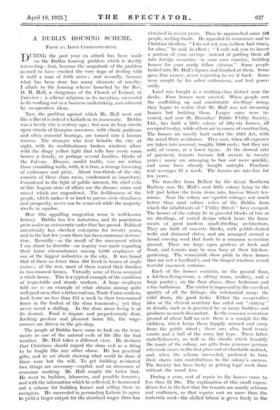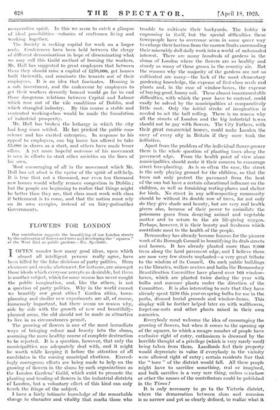A DUBLIN HOUSING SCHEME.
FROM AN IRISII CORRESPONDENT.
DURING the past year an attack has been made on the Dublin housing problem which is doubly interesting—first, because the magnitude of the problem *seemed to have crushed the very hope of dealing with it until a man of faith arose ; and secondly, because what has been done has many elements of novelty.
• I allude to the housing scheme launched by the Rev. D. H. Hall, a clergyman of the Church of Ireland, at Fairview : a scheme religious in its inception, successful in its working out as a business undertaking, and coloured by co-operative ideas.
Now, the problem against which Mr. Hall went out like a David is indeed a Goliath in its immensity. Dublin was a lovely city a century ago ; but now its long streets upon streets of Georgian mansions, with classic porticoes and often armorial bearings, are turned into a human warren. The stranger who first beholds the city at night, with its multitudinous broken windows aflare with the dingy yellow light that tells how every room houses a family, or perhaps several families, thinks of the Inferno. Disease, sordid traffic, vice are within those crumbling walls, with, it is true, a strange leavening of endurance and piety. About two-thirds of the city consists of these slum areas, condemned as insanitary. Considered in the light of public interest, the chief evils of this Augean state of affairs are the disease, crime and unrest which are engendered. The fecklessness of the people, which makes it so hard to pursue civic cleanliness and prosperity, never can be removed while the majority dwells in squalor.
How this appalling congestion arose is well-known history. Dublin has few industries, and its population grew under an aristocratic order that has passed. Political uncertainty has checked enterprise for twenty years, and in the last few years there has been enormous destruction. Recently—as the result of the movement which I am about to describe—an inquiry was made regarding their home circumstances among 1,000 employees of one of the biggest industries in the city. It was found that of these no fewer than 500 lived in homes of single rooms ; of the rest, most of them reared their families in two-roomed homes. Virtually none of them occupied a whole house. This is a typical example of the condition of respectable and steady workers. A large employer told me as an example of what obtains among quite well-paid men, that a father and son, Trade Union workers, took home no less than £11 a week to their two-roomed home in the foulest of the slum tenements ; yet they never saved a shilling. In the slum areas living is at its dearest. Food is impure and preposterously dear. Lacking gardens and pleasant home life, the wageearners are driven to the gin-shop.
• The people of Dublin have come to look on the tenements as one of the natural evils of life like the bad weather. Mr. Hall takes a different view. He declares that Christians should regard the slum evil as a thing to be fought like any -other abuse. He has practical gifts, and he set about showing what could be done if there were but the will. To get building re-started two things are necessary—capital, and an assurance of • economic working: Mr. Hall sought the latter first.
He went to builders, labourers, and possible tenants ; and with the information which he collected, he hammered out a scheme for building houses and selling, them to occupiers. He succeeded in persuading Labour to agree to yield a larger output for the standard wages than has 'obtained in recent years. Then he approached some 400 • people, seeking funds. He appealed to conscience and to Christian idealism. "I do not ask you, in these bad times, for alms," he said, in effect ; " I only ask you to invest a portion of your savings—instead of putting them all into foreign securities— in your own country, building houses for your needy fellow citizens." Some people looked into Mr. Hall's figures and laughed at them. Some gave him money, never expecting to see it back. Some were caught by his sober enthusiasm, and lent gener' ously.
Land was bought in a working-class district near the docks. Four houses were erected. When people saw the scaffolding up and comfortable dwellings rising, they began to realize that Mr. Hall was not dreaming houses but building them. Larger sums were invested, and now St. Barnabas' Public Utility Society, Ltd., has built a little colony of fifty-six houses, all occupied to-day, while others are in course of construction, The houses are mostly built under the 1919 Act, with the usual State assistance. They cost, when all expenses are taken into account, roughly £600 each ; but they are sold, of course, at a lower figure. At the slowest rate of payment, tenants become full owners in twenty years ; ninny arc arranging to buy out more quickly, and some have already bought outright. Purchase rent averages £1 a week. The houses are rate-free for ten years.
The traveller from Belfast by the Great Northern Railway sees Mr. Hall's neat little colony lying to the left just before the train slows into Amiens Street terminus. Near the colony are squalid cottages not much better than mud cabins—relies of the Dublin from which the inhabitants of" Utility Street" have escaped. The houses of the colony lie in graceful blocks of two or six dwellings, of varied design which bears the lineaments of good modern small-dwelling architecture. They are built of concrete blocks, with pebble-dashed walls and diamond slates, and are arranged around a broad curving road that leads to a common recreation ground. There are large open gardens at back and front, and tenants may be seen busy at their kitchengardening. The womenfolk show pride in these homes that are not a landlord's, and the hinged windows reveal tasteful casement curtains.
Each of the houses contains, on the ground floor, a kitchen-living-room, a sitting room, scullery, and a large pantry ; on the floor above, three bedrooms and a fine bathroom. The visitor is impressed by the excellent quality of all the fittings—the substantial range. the solid doors, the good locks. Either the co-cperltive idea or the clerical secretary has ruled out " cutting " in details, such as is practised by so many builders and produces so much discomfort. In the common recreation ground of about half an acre there is a sandpit for the children, which keeps them happily amused and away from the public street ; there arc, also, hard tennis courts and a ball of the army hut type. These latter embellishments, as well as the shrubs which beautify the roads of the colony, are gifts from generous persons who took shares in the first place out of charitable instinct, and, when the scheme succeeded, preferred to turn their shares into contributions to the colony's success. The Society has been lucky in getting legal work done without the usual fees.
During a year, cost of repair to the houses came to less than £2 10s. The explanation of this small expenditure lies in the fact that the tenants are mostly artisans and craftsmen, so that repairs cost no more than the materials used—the skilled labour is given freely in the co-operative spirit. In this we seem to catch a glimpse of ideal possibilities—colonies of craftsmen living and working together.
The Society is seeking capital for work on a larger scale. Conferences have been held between the clergy of different denominations in hope of disseminating what we may Call this Guild method of housing the workers. Mr. Hall has suggested to great employers that between them they should raise a capital of £250,000, get houses built therewith, and nominate the tenants out of their employees. It is an idea that fascinates. Housing is a safe investment, and the endeavour by employers to get their workers decently housed would go far to end those dangerous relations between Capital and Labour which rose out of the vile conditions of Dublin, and -which strangled industry. By this course a stable and contented working-class would be made the foundation of industrial prosperity.
Mr. Hall has broken the lethargy in which the city had long since settled. He has pricked the public conscience and has excited enterprise. In response to his appeal to employers, one big house has offered to take £5,000 in shares as a start, and others have made lesser offers. A yet more hopeful outcome of his movement is seen in efforts to start other societies on the lines of his own.
Most encouraging of all in the movement which Mr. Hall has set afoot is the uprise of the spirit of self-help. It is true that not a thousand, nor even ten thousand new houses would wholly remove congestion in Dublin ; but the people arc beginning to realize that things might be better than they are, that class must work with class if betterment is to come, and that the nation must rely on its own energies, instead of on fairy-godmother Governments.











































 Previous page
Previous page